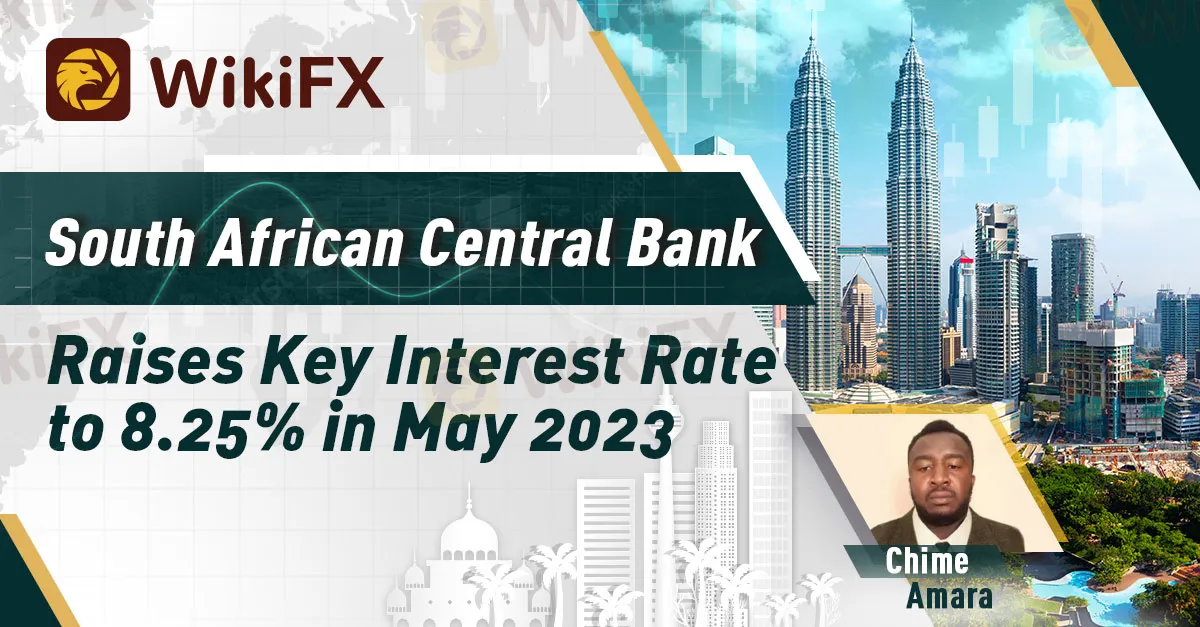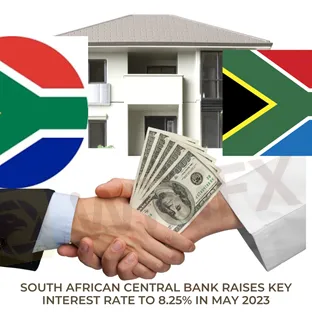简体中文
繁體中文
English
Pусский
日本語
ภาษาไทย
Tiếng Việt
Bahasa Indonesia
Español
हिन्दी
Filippiiniläinen
Français
Deutsch
Português
Türkçe
한국어
العربية
South African Central Bank Raises Key Interest Rate to 8.25% in May 2023
Abstract:In a bid to contain the rising inflation rate, South African Reserve Bank (SARB) raised its key interest rate by 50 basis points to 8.25% in May 2023 marking its highest level since 2009.

By: Chime Amara

The South African Reserve Bank (SARB) raised its key interest rate by 50 basis points to 8.25% in May 2023, to contain inflation the country's high inflation rate. The move was the tenth consecutive rate hike by the SARB, and brings the repo rate to its highest level since 2009.
In a statement, the SARB said that the decision to raise rates was taken in light of the “continued high levels of inflation” in South Africa. Inflation in South Africa rose to 6.5% in April, well above the SARB's target range of 3% to 6%.
The SARB said that it expects inflation to remain elevated in the near term, but that it should start to decline in the second half of 2023. The bank further stated that it remains committed to bringing inflation down to its target in 2023.
The rate hike is likely to have a significant impact on the South African economy. Higher interest rates will make it more expensive for businesses to borrow money, which could lead to slower economic growth. However, the rate hike could also help to cool inflation, which would benefit consumers.
The rand, the South African currency, fell sharply after the rate hike, hitting a record low against the US dollar. The rand has been under pressure in recent months due to several factors, including the country's high debt levels and political uncertainty.
Overall, the rate hike is a good sign that the SARB is taking inflation seriously. However, it remains to be seen whether the rate hikes will be enough to bring inflation under control. The SARB will likely continue to monitor inflation closely in the coming months and may raise rates further if necessary.

Disclaimer:
The views in this article only represent the author's personal views, and do not constitute investment advice on this platform. This platform does not guarantee the accuracy, completeness and timeliness of the information in the article, and will not be liable for any loss caused by the use of or reliance on the information in the article.
Read more

Has the Yen Lost Its Safe-Haven Status?
The Japanese yen failed to create a miracle in 2024, continuing its four-year decline against the US dollar. Does the yen still retain its safe-haven properties? Will the interest rate differential between the US and Japan narrow?

Will the Fed Cut Rates in 2025? What to Expect
The Federal Reserve has implemented multiple interest rate cuts in 2024, bringing the rate to a range of 4.25%-4.5% by the end of the year. However, whether the Fed will continue cutting rates or shift to rate hikes in 2025 remains uncertain. The Fed's policy direction depends not only on economic data but also on internal adjustments, the policy direction of the new president, and other factors.

The WikiFX 2024 Annual User Report is here! Come and claim your exclusive identity!
Looking back at the past year, Whether it’s checking the credibility of brokers or browsing the latest forex news, WikiFX has become your indispensable and reliable assistant.

Will Inflation Slow Down in the New Year 2025?
Will inflation slow down in 2025? Experts weigh in on projections, economic policies, and potential impacts, offering insights into what the new year may hold.
WikiFX Broker
Latest News
WikiEXPO Global Expert Interview: Loretta Joseph——Unlock the forefront of digital finance
Vietnamese Police Bust $1.2 Million Crypto Fraud Case
XTB Receives Licenses to Operate in Indonesia & UAE
SEBI Bans Big "Finfluencers for Misleading Investors"
WikiFX New Year Bash: Chance to Win 70 USDT
Will Gold Break $2,625 Amid Fed Caution and Geopolitical Risks?
ECB Targets 2% Inflation as Medium-Term Goal
New Year, New Surge: Will Oil Prices Keep Rising?
Will Gold Shine Brighter in 2025?
WikiFX Review: Is HYCM still reliable in 2024?
Currency Calculator






